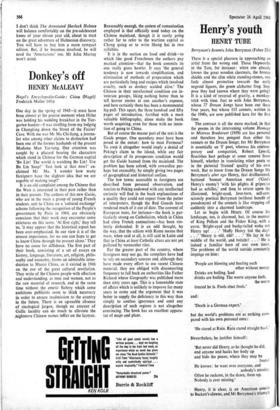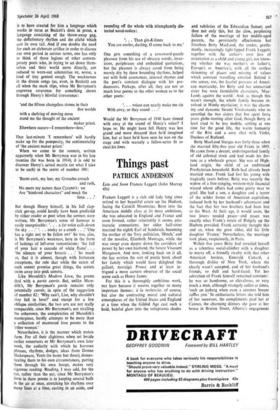Henry's youth
HENRY TUBE
Berryman's Sonnets John Berryman (Faber 21s) There is a special pleasure in approaching an artist from the wrong end. Those Hepworths in the Tate, for instance : when one already knows the great wooden chestnuts, the bronze shields and the slim white standing-stones, one feels almost protective towards the early negroid figures, the green alabaster frog. Sup- pose they had known where they were going! It is a kind of" reversal of gravity, a monkey- trick with time. Just so with John Berryman, whose 77 Dream Songs have been out these four years, but whose 115 sonnets, written in the 1940s, are now published here for the first time.
The contrast is all the more marked, in that the poems in the intervening volume Homage to Mistress Bradstreet (1959) are less personal and therefore less pungent than either the sonnets or the Dream Songs; for Mr Berryman is essentially an 'I' poet, whereas his contem- porary and compatriot, Robert Lowell, flourishes best perhaps at some remove from himself, whether in translating other poets or in the pictorial 'framed' quality of his own work. But to know from the Dream Songs Mr Berryman's alter ego Henry, that disillusioned, battered 'human American man' ('God's Henry's enemy') 'with his plights & gripes/as bad as achilles,' and then to return upon the illusioned, bright-eyed, love-torn, self-con- sciously poetical Berryman (without benefit of pseudonym) of the sonnets is like stepping off suddenly into a charmed landscape.
Let us begin with Henry. Of course his landscape, too, is charmed, but, in the manner of King Pellam and the Fisher King, with a curse. 'Bright-eyed and bushy-tailed woke not Henry up! . . ."Huffy Henry hid the day! . . ."Henry is old, old! . . ."He lay in the middle of the world, and twitcht! . . .' He is indeed a familiar hero of our own times. The problems of the world outside constantly impinge on him: 'People are blowing and beating each other without mercy.
Drinks are boiling. Iced drinks are boiling. The worse anyone feels, the worse treated he is. Fools elect fools.'
and : 'Death is a German expert.'
but the world's problems are as nothing com- pared with his own personal ones: 'He stared at Ruin. Ruin stared straight back.' Nevertheless, he justifies himself : 'But never did Henry, as he thought he did, end anyone and hacks her body up and hide the pieces, where they may be found.
He knows: he went over everyone, and nobody's missing.
Often he reckons, in the dawn, them up. Nobody is ever missing.'
Henry, it is clear, is an American cousin to Beckett's clowns, and Mr Berryman's triumph is to have created for him a language which works in verse as Beckett's does in prose, a language consisting of the throw-away gag, the deflationary rhythm and the cliché which eats its own tail. And if one doubts the need for such an elaborate artifice in order to discuss our own period in serious terms, one has only to think of those legions of other contem- porary poets who, in trying to set down them- selves and their world more directly, are reduced to worn-out solemnities or, worse, a kind of tiny genteel oough. The weaknesses in the dream songs (as, even, in Beckett) are all when the mask slips, when Mr Berryman's unproven reverence for something shows through Henry's blissful irreverence: `and the fifteen changeless stones in their five worlds with a shelving of moving moss stand me the thought of the ancient maker priest.
Elsewhere occurs—I remembers—loss.'
That last-minute 'I remembers' will hardly make up for the pomposity, the sentimentality of 'the ancient maker priest.'
When we come to the sonnets, written apparently when Mr Berryman was in his late twenties (he was born in 1914), it is odd to discover Henry's actual matrix (or what I take to be such) in the sextet of number 100: `Burnt cork, my leer, my Groucho crouch and rush, No more my nature than Cyrano's: we Are "hindered characters" and mock the time. . .
But though Henry himself, in his full slap- stick get-up, could hardly have been predicted by either reader or poet when the sonnets were written, Mr Berryman's sense of humour is easily recognisable: . . a fat voice calls down the sky . . .". . . cocky as a comb . . : 'One has a right not to se fallen on!' So too, alas, is Mr Berryman's weakness, here in the form of lashings ,of left-over romanticism: 'the fall of your hair a cascade of white flame' . . . `the silences of your breasts . . .' So much so, that it is almost, though with fortunate exceptions, the rule that while the octets of each sonnet promise great things, the sextets swim away into pink sunsets.
Like Meredith's Modern Love, the poems deal with a partie cart*. But, unlike Mere- dith's, Mr Berryman's partie remains only potentially cart*, in spite of the suggestion of number 82: 'Why can't, Lise, why shouldn't they fall in love?' and except for a few oblique similarities, the two sets are not really comparable, since Mr Berryman's, not rivalling the coherence, the complexities of Meredith's masterpiece, hardly attempts to be more than a collection of mannered love poems to the `other woman.'
Nevertheless, it is the manner which makes them. For all their slightness when set beside earlier sonneteers or Mr Berryman's own later work, the audacity with which he borrows phrases, rhythms, dodges, ideas from Donne Shakespeare, Yeats (to name but three), domes- ticating them to his own circumstances, putting them through his own hoops, makes very vigorous reading. Reading, I may add, for the eye, rather than the ear, since Mr Berryman's forte in these poems is in keeping several balls in the air at once, stretching his rhythms over many lines at a time, casting in an aside, and minding off the whole with triumphantly dis- torted word-orders: `. . . Than gin-&-limes You are cooler, darling, 0 come back to me.'
One gets something of a crossword-puzzle pleasure from his use of obscure words, inver- sions, periphrases and embedded quotations, but the pleasure is always saved from being merely dry by those bounding rhythms, helped out with bold assonances, internal rhymes and the poet's constant dialogue with his pre- decessors. Perhaps, after all, they are not so much love poems to the other woman as to the other poets: . . voices can nearly make me sin With envy, so they sound . .
Would the Mr Berryman of 1940 have sinned with envy at the sound of Henry's voice? I hope so. He might have felt Henry was less grand and more decayed than he'd imagined him, but at least he'd have seen he was on the stage and with scarcely a fellow-actor fit to steal his lines.







































 Previous page
Previous page